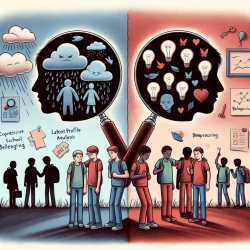As educators and therapists working with children and adolescents, understanding the dynamics of peer aggression is crucial. Recent research titled Challenging the “‘Mean Kid”’ Perception: Boys’ and Girls’ Profiles of Peer Victimization and Aggression from 4th to 10th Grades sheds light on this complex issue. This study provides valuable insights into the profiles of students involved in peer aggression, challenging traditional perceptions and offering guidance for practitioners seeking to improve their interventions.
The Study's Key Findings
The research utilized latent profile analysis to identify three main profiles among students: uninvolved, victim-only, and victim-aggressor. Notably absent was a pure aggressor profile, suggesting that the stereotypical "mean kid" may not be as prevalent as once thought. Here's a breakdown of the findings:
- Uninvolved Students: The majority of students fell into this category, showing little involvement in aggression or victimization.
- Victim-Only Profile: These students reported being victims but not aggressors. They often experienced lower school belonging and higher depressive thoughts compared to uninvolved peers.
- Victim-Aggressor Profile: This group reported both experiencing and perpetrating aggression. They perceived higher levels of school violence and had the poorest adjustment outcomes.
Implications for Practitioners
The absence of a pure aggressor profile suggests that interventions should focus not only on those who are aggressive but also on those who are victims or both victims and aggressors. Here are some strategies practitioners can consider:
- Holistic Support: Provide comprehensive support that addresses both victimization and aggressive behaviors. Encourage open communication and create safe spaces for students to express their experiences.
- Promote School Belonging: Foster a sense of belonging by creating inclusive environments where all students feel valued and connected.
- Mental Health Interventions: Implement programs that address depressive thoughts and promote mental well-being among students involved in peer aggression.
Encouraging Further Research
This study highlights the importance of understanding the nuanced profiles of students involved in peer aggression. Practitioners are encouraged to delve deeper into this topic by exploring additional research and considering cultural differences in aggression dynamics. Collaboration between researchers and practitioners can lead to more effective strategies for supporting students.
To read the original research paper, please follow this link: Challenging the “‘Mean Kid”’ Perception: Boys’ and Girls’ Profiles of Peer Victimization and Aggression from 4th to 10th Grades.










